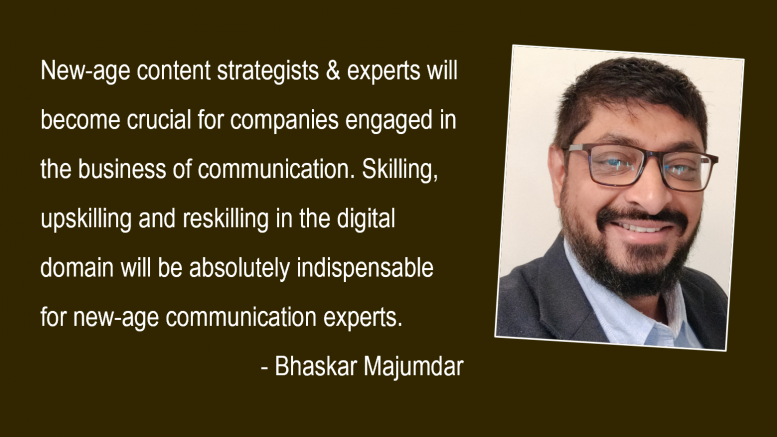We have all heard the popular adage, “Change is the only constant!” Nothing can be truer than this and it is relevant across everything we can think of, and the business of communication, of which, public relations is an integral part, is no exception. What is also means that, whoever fails to keep pace with the changing times, will be rendered redundant, sooner or later. Off late, as the global pandemic accelerated the pace of digital transformation, we began to hear terms like ‘reskilling’, ‘upskilling’, ‘relearning’, all the more than ever before. The answer to the ‘why’ is encapsulated in the adage I quoted above.
The public relations industry, since the very beginning, embraced ‘relationships’ or ‘media relations’ as the be all and end all of success. Professionals who had robust relations or can get client’s stories, not only landed better job offers but were also revered by bosses and colleagues alike. Reputed and large PR firms harnessed this skill set and recruited the conversationalists who had good understanding of the media environment as well as equally good media relations. Although there is nothing wrong in that, but, what was once held as a ‘must have’ skill amongst PR professionals, is now just a ‘good to have skill’.
The debate between traditional print media and digital media is as old as the advent of digitisation itself. Right when the pandemic caught the world unaware, print media or traditional media as we know it, were the first to get hit. Advertising revenues and marketing budgets started to plummet, reminiscent of any hope of print reviving was also 1fading away. With today’s netizens increasingly preferring bite-sized, snackable, crisp content that they can consume on the move, on any handheld device of their choice, thanks to their fast-paced lifestyles, will a permanent change in content consumption behaviour eventually occur? It is still left for us to see. Though the onslaught of digital platforms, smartphones, and the internet has long been impacting newspaper’s reach, readership and circulation in urban and rural India alike, a print will never completely perish, rather it will adapt to the changing times.
Given this aforementioned scenario, if we talk about the business of communication, specifically, be it public relations, influencer communication, marketing etc, we can clearly state that Digital Outreach and Social Media Outreach will now be an integral part of all well entrenched communication campaign strategies and execution planning.
Traditional media inherently has several checks and balances in place before it reaches the audience’s desk. Therefore, its credibility and authenticity are seldom questioned and can seldom be compromised. Highly curated columns and OPEDs, mainstream reporting are still some areas where print rules. Digital on the other hand, despite exhibiting mammoth potential and promise, has its own flipside, such as unverified user-generated content, untrue information “forwards” among such others.
Therefore, while planning campaigns and devising communication strategies, brands are going for a kind of Media Mix, which has both digital and traditional approaches intertwined into each other – or as they call it, “Integrated Communications.”
Having said that, it largely depends on #brands #services #products to decide, as to what kind of Media Mix they should go for, what concoction of traditional and digital they want to keep in their communication strategy – all these depend on the kind of target audience they want to reach out to, or what category of markets are they targeting. A B2B brand will have different requirements, different target audience, etc, when compared to a B2C brand. Similarly, a government entity may focus more on traditional media whereas a FMCG or consumer brand may prioritise digital outreach platforms and digital mediums, over traditional mediums.
Also, as the digital medium is more real-time, instant, more engaging, immersive, can be creatively adapted – for several brands, communication and messaging through the digital platform is definitely more impactful. Going forward, communication strategists will have to have robust understanding of the digital medium as it will become an integral part of all key communication campaigns. Even now, we see, several brands are effectively using KOL outreach programs, reaching out to influencers on Instagram and Facebook, tapping on to micro-influencers, or regional influencers, youtubers and bloggers to get their messaging across and to reach out to specific sets of target audience, more relevantly, efficiently and, in real time.
Also, as digital is increasingly becoming a de-facto choice for content consumers, innovations and re-engineered content and distribution strategies will continue to evolve as we move forward. Apps, online news platforms and other digital offerings by a few print media are already bridging several existing gaps when it comes to penetration among the vernacular language reader base.
Hence, the emergence of new age content strategists and experts will become crucial for companies engaged in the business of communication. Skilling, Upskilling, and reskilling themselves in the digital domain, will be absolutely indispensable for the new age communication experts. They need to be able to create customised content in accordance to the platform or distribution channels that they are targeting. For example, keeping the messaging intact, content can be adapted for various mediums such as AR-based platforms, interactive videos, mobile apps, podcasts, videos and webinars, among others. Content strategies of the future needs to be innovative, sublime, integrated and tailored for omni-channel distribution, while ensuring that the brand messaging remains sacrosanct.
As the digital era flourish going forward, content strategies and the overall ecosystem will evolve to become more dynamic and future-ready in its essence.
The views and opinions published here belong to the author and do not necessarily reflect the views and opinions of the publisher.
This article is part of a series by APACD members.



Be the first to comment on "How #Covid fast forwarded the #digital transformation"